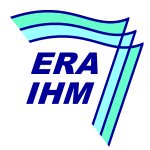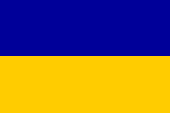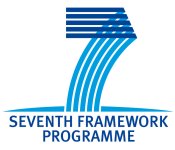|
|
 In March 2012, the Ukrainian participants of ERAIHM project have visited the
Delft University of Technology in the Netherlands. The delegation of the Institute
of Hydromechanics was composed of ERAIHM Coordinator Prof. Eugene Nikiforovich,
Project Secretary Dr. Valery Oliynik and postgraduate student Nina Dmitrenko.
This mission was synchronized with study activities of the projects
CREDO and
IEMAST executed within the frameworks
the European Union's Program for the University Studies,
TEMPUS.
The invited group was totally about two dozens of participants representing the
Ukraine, Azerbaijan, Belarus, Kazakhstan, Kyrgyzstan, Moldova, Bosnia and Herzegovina.
Our partners from the Royal Technological Institute (Stockholm, Sweden) have also taken
an active part in all held events.
In March 2012, the Ukrainian participants of ERAIHM project have visited the
Delft University of Technology in the Netherlands. The delegation of the Institute
of Hydromechanics was composed of ERAIHM Coordinator Prof. Eugene Nikiforovich,
Project Secretary Dr. Valery Oliynik and postgraduate student Nina Dmitrenko.
This mission was synchronized with study activities of the projects
CREDO and
IEMAST executed within the frameworks
the European Union's Program for the University Studies,
TEMPUS.
The invited group was totally about two dozens of participants representing the
Ukraine, Azerbaijan, Belarus, Kazakhstan, Kyrgyzstan, Moldova, Bosnia and Herzegovina.
Our partners from the Royal Technological Institute (Stockholm, Sweden) have also taken
an active part in all held events.
 During the visit, the IHM delegation was not only permitted to organise the personal
consultations with the partners concerning the current tasks of ERAIHM project and
plan the work for the nearest perspective, but had a chance for acquainting with
the experience of organisational, research and teaching activities in TU Delft in
the fields of technology management and industrial ecology. Also, it was a good
opportunity for widening and strengthening of the contacts with our colleagues from
high schools of the post-Soviet countries. All mentioned above corresponds to
the letter and spirit of ERAIHM provisions stipulating the enhancing of IHM publicity
and attraction for international cooperation.
During the visit, the IHM delegation was not only permitted to organise the personal
consultations with the partners concerning the current tasks of ERAIHM project and
plan the work for the nearest perspective, but had a chance for acquainting with
the experience of organisational, research and teaching activities in TU Delft in
the fields of technology management and industrial ecology. Also, it was a good
opportunity for widening and strengthening of the contacts with our colleagues from
high schools of the post-Soviet countries. All mentioned above corresponds to
the letter and spirit of ERAIHM provisions stipulating the enhancing of IHM publicity
and attraction for international cooperation.
Our colleagues from the universities were interested first of all in organisation
and methodology of teaching process, specific of creating of new courses on the novel
specializations. For the researchers from IHM, the most valuable was the comprehension
of the concept of Sustainable Technological Development as the specific coordinate system,
which should arrange the framework for minding of the modern researchers and engineers.
|
5 March
(the day of arrival) was dedicated to getting group together and accustoming to new place.
The organisational meeting with finalizing of working agenda has been held at the evening.
The complete programme of the planned and held events may be found here:
[PDF].
|
 6 March
has begun from acquainting with the history of TU Delft, starting from its
foundation according the decree of king Willem II as a Royal Academy for
the education of civilian engineers. In the country, it was the first educational
institute of such kind. Nowadays, TU Delft with its 17 thousands of the students
and almost 2600 academic staff is one of the leading technical high schools
in the Netherlands recognized all over the world. This is the reason for the
fact that 15% of person trained here are the students coming from the other
countries. Let you come to think of it, the every fifth in the small Delft
is related with its University!
6 March
has begun from acquainting with the history of TU Delft, starting from its
foundation according the decree of king Willem II as a Royal Academy for
the education of civilian engineers. In the country, it was the first educational
institute of such kind. Nowadays, TU Delft with its 17 thousands of the students
and almost 2600 academic staff is one of the leading technical high schools
in the Netherlands recognized all over the world. This is the reason for the
fact that 15% of person trained here are the students coming from the other
countries. Let you come to think of it, the every fifth in the small Delft
is related with its University!
 The scientific program of the first day was dealt with the problems of
Sustainable Development. The most impressive was the lecture "The Technology
Challenge: Satisfying the Human Needs in the Sustainable World" presented by
Professor Emeritus in Environmental Technologies Leo Jansen, who is the
acknowledged expert in this field and has formerly occupied high governmental
positions. The necessity for transition of comprehension of Sustainable Development
as the strategic pragmatism in economy to the transdisciplinary conception with interacting
of the society culture specifying the value orientation, its structure determining the
organisation and technologies providing the means for proceeding to specified goals
was accented in his speech.
The scientific program of the first day was dealt with the problems of
Sustainable Development. The most impressive was the lecture "The Technology
Challenge: Satisfying the Human Needs in the Sustainable World" presented by
Professor Emeritus in Environmental Technologies Leo Jansen, who is the
acknowledged expert in this field and has formerly occupied high governmental
positions. The necessity for transition of comprehension of Sustainable Development
as the strategic pragmatism in economy to the transdisciplinary conception with interacting
of the society culture specifying the value orientation, its structure determining the
organisation and technologies providing the means for proceeding to specified goals
was accented in his speech.
|
 7 March,
training session on Fp7 experiences.
TU Delft researchers and research managers presented the experience
of the University participation in Fp7 projects. The
Ukrainian ERAIHM participants together with the partners from KTH and TU Delft
have discussed the ideas of joint applications to coming Fp7 calls on Energy
and Environment as well as Marie Curie Programme.
7 March,
training session on Fp7 experiences.
TU Delft researchers and research managers presented the experience
of the University participation in Fp7 projects. The
Ukrainian ERAIHM participants together with the partners from KTH and TU Delft
have discussed the ideas of joint applications to coming Fp7 calls on Energy
and Environment as well as Marie Curie Programme.
The discussed topics were concentrated around the Industrial Ecology being
one of the most important components of Sustainable Development. The
modern stage of scientific thinking in the developed European countries is
characterized by a resolute turn from meaning of Industrial Ecology as just a
discipline considering the material and energy flows through industrial system
to its wider treating as a systems-based, multidisciplinary discourse
that seeks to understand emergent behaviour of complex integrated human/natural
systems. The question per se is: if the industrial human establish the sustainable
symbiosis with nature, or Earth ecosystem would re-establish new equilibrium
without vanishing of mankind. That is why one of the leading roles within the
perspective task of more than order increasing of economy efficiency
belongs to drastic reduction of industrial and agricultural ecological footprint.
Moreover, closed inter-industry loops should be set up, allowing as complete as possible
utilizing of waste of every production type as raw material for the next one.
 That evening, the ERAIHM team had a pleasure to attend a seminar of the student
Energy Club where current opportunities for the development of alternative energy sources
in domestic industry were discussed with high interest. Indeed, the Netherlands
are famous as one of world leaders in Wind Energy Engineering. We got added evidence
that these are events that accomplish the basic syllabus and promote the
training of qualified engineers and managers looking for the prospect of both
the sustainable society development, and their decent place in it.
That evening, the ERAIHM team had a pleasure to attend a seminar of the student
Energy Club where current opportunities for the development of alternative energy sources
in domestic industry were discussed with high interest. Indeed, the Netherlands
are famous as one of world leaders in Wind Energy Engineering. We got added evidence
that these are events that accomplish the basic syllabus and promote the
training of qualified engineers and managers looking for the prospect of both
the sustainable society development, and their decent place in it.
|
 8 March
was the day of intensive work of Ukrainian ERAIHM participants together with their
partners Dr. Linda Kamp and Dr. Jaco Quist. The current problems concerning the
implementing of the planned tasks on backcasting and estimation of the innovation
attraction of energy sector of Ukraine have been discussed along with creating of
vision of the future development of city Kyiv heating system for the period up to 2030.
The parameters, structures and scale of the follow-up model of city heating/cooling.
The accent was made on that the model under development is the decision-making instrument
rather than physical system. The structure of the planned interviews with stakeholders
has been discussed in detail. The problem of search for high-level stakeholders
within extremely limited time has been mentioned.
8 March
was the day of intensive work of Ukrainian ERAIHM participants together with their
partners Dr. Linda Kamp and Dr. Jaco Quist. The current problems concerning the
implementing of the planned tasks on backcasting and estimation of the innovation
attraction of energy sector of Ukraine have been discussed along with creating of
vision of the future development of city Kyiv heating system for the period up to 2030.
The parameters, structures and scale of the follow-up model of city heating/cooling.
The accent was made on that the model under development is the decision-making instrument
rather than physical system. The structure of the planned interviews with stakeholders
has been discussed in detail. The problem of search for high-level stakeholders
within extremely limited time has been mentioned.
 During visiting of the University campus, the main interest was attracted
to presentation of transport means with solar gear made by the Aerospace Engineering
faculty. The case is that the team from TU Delft is the permanent participant and
repeated winner (2001 to 2007) of the famous Australian solar car races as well,
as prestigious competitions Frisian Solar Challenge for solar driven boats.
The projects of the electric generator using the computer controlled kite and the
"superbus", a prototype of the future bus transport facility,
also deserve for attention.
During visiting of the University campus, the main interest was attracted
to presentation of transport means with solar gear made by the Aerospace Engineering
faculty. The case is that the team from TU Delft is the permanent participant and
repeated winner (2001 to 2007) of the famous Australian solar car races as well,
as prestigious competitions Frisian Solar Challenge for solar driven boats.
The projects of the electric generator using the computer controlled kite and the
"superbus", a prototype of the future bus transport facility,
also deserve for attention.
|
 On 9 March,
we have had an opportunity to see with our own eyes the achievements of the Netherlands
in Sustainable Development and Industrial ecology. This day we have visited the unique
system of hydroengineering constructions at the North Sea situated in Rhine-Meuse-Scheldt
delta that serves for flood protection of the country which at least one half lies
below the sea level. Due to its really Cyclopean dimensions, the project
"Delta" (this is its official name) is nominated for one of the
Seven Wonders of the Modern World. It is difficult to outline the exact term of its
execution, but the historically highest catastrophic flood of 1953 has become the
main stimulus for starting the works. The most intensive construction was carried out in
the 1970-1980-th and the project in in whole is considered to be finished to 1997.
However, some sources point out even the August of 2010. Moreover, the ongoing measures
for modernisation and replacement of the face walls at Eastern Scheldt will last for
the period of 1996-2015. In total, about 2400 km of main dams and 14080 km of
auxiliary ones have been constructed, as well as 300 buildings. Up to 2.5 billion €
have been spent for these purposes.
On 9 March,
we have had an opportunity to see with our own eyes the achievements of the Netherlands
in Sustainable Development and Industrial ecology. This day we have visited the unique
system of hydroengineering constructions at the North Sea situated in Rhine-Meuse-Scheldt
delta that serves for flood protection of the country which at least one half lies
below the sea level. Due to its really Cyclopean dimensions, the project
"Delta" (this is its official name) is nominated for one of the
Seven Wonders of the Modern World. It is difficult to outline the exact term of its
execution, but the historically highest catastrophic flood of 1953 has become the
main stimulus for starting the works. The most intensive construction was carried out in
the 1970-1980-th and the project in in whole is considered to be finished to 1997.
However, some sources point out even the August of 2010. Moreover, the ongoing measures
for modernisation and replacement of the face walls at Eastern Scheldt will last for
the period of 1996-2015. In total, about 2400 km of main dams and 14080 km of
auxiliary ones have been constructed, as well as 300 buildings. Up to 2.5 billion €
have been spent for these purposes.
 The ERAIHM team has visited the largest of 13 dams of the project, Oosterscheldekering.
This construction is 36 to 40 meters high, and 62 its runs with the attached lifting
gates are 42 meters long. Actually, the hydroconstructions of "Delta" after their
operation principle are rather the sluice system then dams: usually, water gates are open
and do not block the rising or low tides. The sluice mechanisms are being closed only in
the special cases of the storm wind coinciding with the rising tide causing water pileup
threatening with flood. So, the system has been built in the manner allowing the minimization
of influence on the natural processes in the environment.
The ERAIHM team has visited the largest of 13 dams of the project, Oosterscheldekering.
This construction is 36 to 40 meters high, and 62 its runs with the attached lifting
gates are 42 meters long. Actually, the hydroconstructions of "Delta" after their
operation principle are rather the sluice system then dams: usually, water gates are open
and do not block the rising or low tides. The sluice mechanisms are being closed only in
the special cases of the storm wind coinciding with the rising tide causing water pileup
threatening with flood. So, the system has been built in the manner allowing the minimization
of influence on the natural processes in the environment.
 This day we have also attended the nature protection zone situated on the Tiengemeten
island. It is the unique ecological object, the agricultural territory in the past that
has been returned to wild nature. Here, ecologists have destroyed the system of
the small irrigation dams and channels that penetrate the Netherlands and renewed
the initial conditions for living of wild animal species. It worth noting that
during the visit we were striken by the plenty of wild swimming birds neighbouring the men.
This day we have also attended the nature protection zone situated on the Tiengemeten
island. It is the unique ecological object, the agricultural territory in the past that
has been returned to wild nature. Here, ecologists have destroyed the system of
the small irrigation dams and channels that penetrate the Netherlands and renewed
the initial conditions for living of wild animal species. It worth noting that
during the visit we were striken by the plenty of wild swimming birds neighbouring the men.
|
 10 March
was the day of departure. Besides the road impressions, we have taken with us the
great respect to people who have literally winned over their land from the sea,
made it the country of wellbeing and prosperity and profoundly searching for the
prospect of development for the Netherlands, European continent and whole mankind.
10 March
was the day of departure. Besides the road impressions, we have taken with us the
great respect to people who have literally winned over their land from the sea,
made it the country of wellbeing and prosperity and profoundly searching for the
prospect of development for the Netherlands, European continent and whole mankind.
Good bye, Delft! See you again, the Netherlands!
|
|




 ERAIHM
ERAIHM







 ERAIHM
ERAIHM


